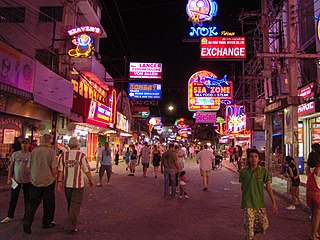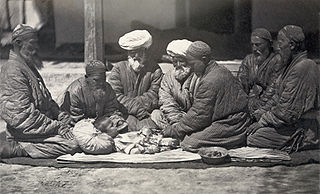
The Asia Pacific Coalition on Male Sexual Health, also known as APCOM, is a network of non-profit organizations which share the mission of improving male sexual health in South Asia, East Asia, and the Pacific Islands.

The Asia Pacific Coalition on Male Sexual Health, also known as APCOM, is a network of non-profit organizations which share the mission of improving male sexual health in South Asia, East Asia, and the Pacific Islands.
APCOM was launched in July 2007 after delegates to the Delhi 2006 International Consultation on Male Sexual Health and HIV in Asia and the Pacific identified a need for more organization in the field of male sexual health. [1]
APCOM was founded as an autonomous, regional coalition of citizen groups, government representatives, funders, technical consultants and the United Nations officials. Its mission is to assist local organizations in advocacy for the rights of MSMs and transgender males. [2]
Men who have sex with men (MSM) are male persons who engage in sexual activity with members of the same sex. The term was created in the 1990s by epidemiologists to study the spread of disease among all men who have sex with men, regardless of sexual identity, to include, for example, male prostitutes. The term is often used in medical literature and social research to describe such men as a group for research studies. It does not describe any specific sexual activity, and which activities are covered by the term depends on context.

Prostitution in Thailand is officially illegal However, due to police corruption and an economic reliance on prostitution dating back to the Vietnam War, it remains a significant presence in the country. It results from poverty, low levels of education and a lack of employment in rural areas. Prostitutes mostly come from the northeastern (Isan) region of Thailand, from ethnic minorities or from neighbouring countries, especially Cambodia, Myanmar, and Laos. UNAIDS in 2019 estimated the total population of sex workers in Thailand to be 43,000.

The global epidemic of HIV/AIDS began in 1981, and is an ongoing worldwide public health issue. According to the World Health Organization (WHO), as of 2021, HIV/AIDS has killed approximately 40.1 million people, and approximately 38.4 million people are infected with HIV globally. Of these 38.4 million people, 75% are receiving antiretroviral treatment. There were about 770,000 deaths from HIV/AIDS in 2018, and 650,000 deaths in 2021. The 2015 Global Burden of Disease Study estimated that the global incidence of HIV infection peaked in 1997 at 3.3 million per year. Global incidence fell rapidly from 1997 to 2005, to about 2.6 million per year. Incidence of HIV has continued to fall, decreasing by 23% from 2010 to 2020, with progress dominated by decreases in Eastern Africa and Southern Africa. As of 2020, there are approximately 1.5 million new infections of HIV per year globally.
Dennis Patkin Altman is an Australian academic and gay rights activist.

Manvendra Singh Gohil is an Indian prince, being the son and probable heir of the honorary Maharaja of Rajpipla. He is considered to be the first openly gay prince in the world, and he is known for being one of India's foremost LGBT activists. He runs a charity, the Lakshya Trust, which works with the LGBT community.

In 2008, 4.7 million people in Asia were living with human immunodeficiency virus (HIV). Asia's epidemic peaked in the mid-1990s, and annual HIV incidence has declined since then by more than half. Regionally, the epidemic has remained somewhat stable since 2000.

Circumcision is a procedure that removes the foreskin from the human penis. In the most common form of the operation, the foreskin is extended with forceps, then a circumcision device may be placed, after which the foreskin is excised. Topical or locally injected anesthesia is generally used to reduce pain and physiologic stress. Circumcision is generally electively performed, most commonly done as a form of preventive healthcare, as a religious obligation, or as a cultural practice. It is also an option for cases of phimosis, other pathologies that do not resolve with other treatments, and chronic urinary tract infections (UTIs). The procedure is contraindicated in cases of certain genital structure abnormalities or poor general health.

The prevalence of circumcision is the percentage of males in a given population who have been circumcised, with the procedure most commonly being performed as a part of prophylactic healthcare, a religious obligation, or cultural practice. Yosha & Bolnick & Koyle (2012) states that the global incidence of circumcision has risen and seems likely to continue to do so during the "first half of the twenty-first century".
Since HIV/AIDS was first reported in Thailand in 1984, 1,115,415 adults had been infected as of 2008, with 585,830 having died since 1984. 532,522 Thais were living with HIV/AIDS in 2008. In 2009 the adult prevalence of HIV was 1.3%. As of 2016, Thailand had the highest prevalence of HIV in Southeast Asia at 1.1 percent, the 40th highest prevalence of 109 nations.
Cases of HIV/AIDS in Peru are considered to have reached the level of a concentrated epidemic.
HIV/AIDS in Jamaica has a 1.5 percent prevalence of the adult population estimated to be HIV-positive. There has been no significant change over the last five years and therefore Jamaica appears to have stabilized its HIV/AIDS epidemic.
The first HIV/AIDS case in Malaysia made its debut in 1986. Since then, HIV/AIDS has become one of the country's most serious health and development challenges. As of 2020, the Ministry of Health estimated that 87 per cent of an estimated 92,063 people living with HIV (PLHIV) in Malaysia were aware of their status, 58 per cent of reported PLHIV received antiretroviral therapy, and 85 per cent of those on antiretroviral treatment became virally suppressed. Despite making positive progress, Malaysia still fell short of meeting the global 2020 HIV goals of 90-90-90, with a scorecard of 87-58-85.
The Naz Foundation (India) Trust is a non-governmental organisation (NGO) in that country that works on HIV/AIDS and sexual health. It is based in the Indian capital of New Delhi.

Lesbian, gay, bisexual, and transgender (LGBT) persons in the Marshall Islands may face legal challenges not experienced by non-LGBT residents. Same-sex sexual activity has been legal in the Marshall Islands since 2005, and discrimination on the basis of sexual orientation and gender identity has been outlawed in all areas since 2019. Despite this, households headed by same-sex couples are not eligible for the same legal protections available to opposite-sex married couples, as same-sex marriage and civil unions are not recognized.
HIV prevention refers to practices that aim to prevent the spread of the human immunodeficiency virus (HIV). HIV prevention practices may be undertaken by individuals to protect their own health and the health of those in their community, or may be instituted by governments and community-based organizations as public health policies.
The XVIII International AIDS Conference was held in Vienna, Austria from July 18–23, 2010.
Aditya Bandopadhyay is a lawyer and LGBTQ rights activist in India, helping to challenge anti-sodomy laws, establishing advocacy organizations and providing legal services to HIV/AIDS organizations.

PT Foundation is a community-based, voluntary non-profit making organization providing HIV/AIDS education, prevention, care and support programmes, sexual health and empowerment programmes for vulnerable communities in Malaysia. PT Foundation is the largest community-based HIV/AIDS organization in Malaysia and has benefited more than 100,000 people.

Domestic violence in same-sex relationships is a pattern of violence or abuse that occurs within same-sex relationships. Domestic violence is an issue that affects people of any sexuality, but there are issues that affect victims of same-sex domestic violence specifically. These issues include homophobia, internalized homophobia, HIV and AIDS stigma, STD risk and other health issues, lack of legal support, and the violence they face being considered less serious than heterosexual domestic violence. Moreover, the issue of domestic violence in same-sex relationships has not been studied as comprehensively as domestic violence in heterosexual relationships. However, there are legal changes being made to help victims of domestic violence in same-sex relationships, as well as organizations that cater specifically to victims of domestic violence in same-sex relationships.
HIV/AIDS in Japan has been recognized as a serious health issue in recent years. However, overall awareness amongst the general population of Japan regarding sexually transmitted infections, including HIV/AIDS, remains low.